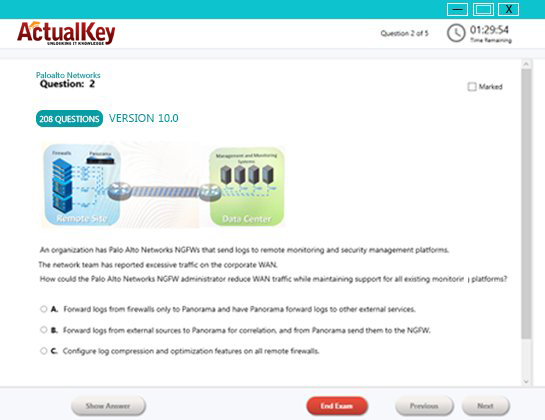Limited Time 30% Discount Offer Use Code - off30
Actualkey Prepration Latest 642-144 : IP Telephony Express(IPTX) Questions and Answers PDF's, Verified Answers via Experts - Pass Your Exam For Sure and instant Downloads - "Money Back Guarantee".
| Vendor | Cisco |
| Certification | IP Communications |
| Exam Code | 642-144 |
| Title | IP Telephony Express(IPTX) |
| No Of Questions | 74 |
| Last Updated | May 8,2024 |
| Product Type | Q & A with Explanation |
| Bundel Pack Included | PDF + Offline / Andriod Testing Engine and Simulator |
642-144 IPTX
IP Telephony Express Exam
Exam Number: 642-144
Associated Certifications: Cisco IP Communications Express Specialist
Exam Description
The IP Telephony Express 642-144 IPTX is the exam associated with the Cisco IP Communications Express Specialist certification. Candidates can prepare for this exam by taking the IP Telephony Express (IPTX) course. This exam tests a candidate's knowledge of VoIP and PSTN components and technologies and the candidate's ability to install, configure and support Cisco Unified CallManager Express and Cisco Unity Express products in a Cisco network. Topics covered include basic VoIP, PSTN, and SIP, CallManager Express and Unity Express.
Exam Topics
The following information provides general guidelines for the content likely to be included on this exam. However, other related topics may also appear on any specific delivery of the exam. In order to better reflect the contents of the exam and for clarity purposed the guidelines below may change at any time without notice.
Describe basic VoIP and PSTN components and technologies
* Describe the function of codecs and the differences between them
* Describe conditions that can effect the quality of VoIP calls
* Describe traditional telephony components including PBX, trunk lines, key-systems, and tie lines
* Describe the components of Cisco Unified Communications architecture
* Describe the analog and digital signaling types used in TDM networks
* Describe the function and application of analog IP Gateways (ATA, NMHDV, FXS, SCCP FXS)
* Describe TAPI and how it applies to the CRM Connector
Describe and configure a Cisco network to support Cisco Unified CallManager Express
* Explain the need for QoS and the locations where QoS is required
* Configure switched infrastructure to support Cisco Unified CallManager Express
* deployment, including VLANs, port configurations, and PoE
* Describe management tools available for Cisco Unified CallManager Express
* Describe the network requirements for supporting teleworkers
Install Cisco Unified CallManager Express in any supported environment.
* Explain the router file system required to support Cisco Unified CallManager Express
* Determine the router hardware features related to Cisco Unified CallManager Express support
* Obtain and load the appropriate Cisco Unified CallManager Express software components
* Describe the requirements and correct settings for DHCP, NTP, and TFTP in a Cisco Unified CallManager Express environment
* Configure DHCP, NTP and TFTP to support Cisco Unified CallManager Express
* Describe Cisco Unified CallManager Express QCT
Configure Cisco Unified CallManager Express to support IP Telephone feature requirements
* Compare and contrast the features of different types of ephones and ephone-dns
* Configure ephones and ephone-dns
Describe initial phone setup process
* Configure analog voice ports per design specifications
* Configure digital voice ports per design specifications
* Configure call-transfer per design specifications
* Configure or enable additional IP phone features, including ring-tones and productivity tools
* Configure dial-peers per design specifications
* Configure digit manipulations to meet design requirements
* Configure Music on Hold
* Configure Cisco Unified CallManager Express to support fax services
* Describe and configure Cisco Unified CallManager Express in key system or PBX mode
* Configure B-ACD application
* Describe and configure a localized version of Cisco Unified CallManager Express
Configure Cisco Unified CallManager Express to support SIP Telephony feature requirements
* Compare and contrast the features of different types of Register-dn and voice register pools
* Configure Register-dn and voice register pools
* Describe initial SIP phone setup process
Configure Cisco Unity Express in a Cisco Unified CallManager Express environment.
* Describe the features available in Cisco Unity Express
* Describe the procedure to install or upgrade the Cisco Unity Express software
* Describe the Cisco Unity Express configuration tasks
* Describe both of the Cisco Unity Express hardware platforms
* Configure Cisco Unity Express system components
* Configure users, groups and mailboxes using CLI
* Describe the configuration requirements to support the GUI
* Configure MWI on/off ports
* Configure pilot number for Cisco Unity Express
* Describe Cisco Unity Express back-up parameters and procedure
* Backup/Restore/Copy configuration files for Cisco Unity Express
* Explain troubleshooting methods using the CLI or GUI
* Describe and configure Cisco Unity Express integrated messaging
* Describe & configure Voice View Express
* Describe and configure a localized version of Cisco Unity Express
* Describe and configure Voicemail networking
Describe basic Cisco Unified CallManager Express and Cisco Unity Express deployment models
* Describe the supported Cisco Unified CallManager Express deployment models
* Describe the supported Cisco Unity Express deployment models
I Got My Success Due To Actualkey 642-144 Bundle Pack Actualkey experts I got passed in the 642-144 exam without any worries at all, these exam material products gave me the reason to relax.
Budi Saptarmat
Yahoo! Got Successfully Through The 642-144 Exam Passing Exam is not a easy thanks to Acutalkey.com for providing me actual 642-144 IP Telephony Express(IPTX) training with there included the Offline and Android simulators helps me success
Melinda
642-144 Exam Best Preparation I have been preparing for 642-144 IP Telephony Express(IPTX), I was not sure that I'll be able to pass because of the fact that I am not a good student however;Actualkey.com provided me best and simple exam training pdf's and I passed. I now recommend everyone
Antonio Moreno
Actualkey.com 642-144 Offline Simulator is Best My choice to select Actualkey.com and go for the preparation 642-144 IP Telephony Express(IPTX), because I got the short way with the easy way
Liliane Meichner
Actualkey.com 642-144 Exam PDF"s passed with in a week 642-144 exam pdf's that's amazing
James Wilson
Cisco - RELATED EXAMS
Implementing Cisco Unified Communications Manager Part 2 (CIPT2 v6.0)
Questions: 174 | May 8, 2024
Implementing Cisco Security Monitoring, Analysis andResponse System
Questions: 49 | May 8, 2024
Cisco Wide Area Application Services for System Engineers exam
Questions: 60 | August 1, 2024
Cisco Data Center Networking Infrastructure Solutions design
Questions: 120 | August 1, 2024
Implementing Cisco Unified Wireless Networking Essentials (IUWNE)
Questions: 203 | July 1, 2024
Associated Certifications: Cisco Storage Networking Support Specialist
Questions: 74 | August 1, 2024
Implementing Cisco Security Monitoring, Analysis, and Response System
Questions: 67 | August 1, 2024
Wide Area Application Services for System Engineers (WAASSE)
Questions: 90 | January 5, 2024
Implementing Advanced Cisco Unified Wireless Security (IAUWS)
Questions: 85 | January 7, 2024
Troubleshooting and Maintaining Cisco IP Switched Networks (TSHOOT)
Questions: 72 | January 7, 2024
Implementing Cisco Unified Communications Voice over IP and QoS v8.0 (CVOICE v8.0)
Questions: 257 | July 1, 2024
Securing Networks with Cisco Routers and Switches (SECURE) v1.0
Questions: 136 | July 1, 2024
Implementing Cisco Unified CommunicationsManager, Part 2 v8.0 (CIPT2 v8.0)
Questions: 215 | July 1, 2024
Introducing Cisco Voice and Unified Communications Administration v8.0
Questions: 300 | May 8, 2024
Integrating Cisco Unified Communications Applications v8.0 (CAPPS v8.0)
Questions: 203 | May 8, 2024
Operational Foundations for Cisco Service Provider Core Networks
Questions: 91 | May 8, 2024
Maintaining Cisco Service Provider VPNs and MPLS Networks (MSPVM)
Questions: 89 | May 8, 2024
Cisco Data Center Unified Computing Support Specialist Qualifier Exam (DCUCI Qualifier Exam)
Questions: 65 | May 8, 2024
Cisco Data Center Unified Computing Design Specialist Qualifier Exam
Questions: 62 | May 8, 2024
Designing for Cisco Internetwork Solutions Exam (DESGN) v2.1
Questions: 241 | October 1, 2024
Maintaining Cisco Service Provider Routing Protocols (MSPRP)
Questions: 70 | October 1, 2024
Maintaining Cisco Service Provider Quality of Service (MSPQS)
Questions: 91 | October 1, 2024
PSACAS Advanced Collaboration Architecture Sales Specialist Exam
Questions: 56 | May 8, 2024
PSACASE Advanced Collaboration Architecture System Engineer Exam
Questions: 64 | May 8, 2024
PSACAFE Advanced Collaboration Architecture Field Engineer Exam
Questions: 50 | August 1, 2024
Cisco IronPort Certified Security Professional (CICSP) Web Security 7.0
Questions: 66 | August 1, 2024
Implementing Cisco TelePresence Video Networking Solutions Exam
Questions: 57 | August 1, 2024
Advanced Borderless Network Architecture Systems Engineer Exam
Questions: 60 | August 1, 2024
Cisco Substation Automation System and Field Engineer Knowledge Verification
Questions: 58 | May 8, 2024
Authorized Connected Grid Account Manager Knowledge Verification
Questions: 23 | August 1, 2024
Cisco Data Center Unified Computing Systems Implementation (DCUCI)
Questions: 78 | May 8, 2024
Introduction to 802.1X Operations for Cisco Security Professionals Exam (S802DT1X)
Questions: 69 | May 8, 2024
Introducing Cisco Identity Services Engine for System Engineer Exam (PAISESE)
Questions: 34 | May 8, 2024
PASCERAM - Cisco SaaS Conferencing and EIM Resale ATP for the AM Exam
Questions: 35 | May 8, 2024
Cisco SP Video Wireline & Cable Headend Design Specialist for SE
Questions: 33 | May 8, 2024
PASCERSE - Cisco SaaS Conferencing and EIM Resale ATP for the SE Exam
Questions: 56 | May 8, 2024
Building Cisco Service Provider Next-Generation Networks, Part 2
Questions: 126 | May 8, 2024
Building Cisco Service Provider Next-Generation Networks, Part 1 Exam
Questions: 257 | October 25, 2024
Implementing Advanced Cisco Unified Wireless Security (IAUWS) v2.0
Questions: 206 | May 8, 2024
Deploying Cisco Service Provider Network Routing (SPROUTE)
Questions: 174 | January 12, 2024
Implementing Cisco Service Provider Next-Generation Core Network Services (SPCORE)
Questions: 184 | January 12, 2024
Implementing Cisco Service Provider Next-Generation Edge Network Services (SPEDGE) Exam
Questions: 185 | January 12, 2024
Implementing and Maintaining Cisco Technologies Using IOS XR - (IMTXR)
Questions: 77 | January 12, 2024
Designing and Implementing Cisco Unified Communications on Unified Computing Systems - DIUCUCS
Questions: 60 | January 12, 2024
Implementing and Configuring Cisco Identity Service Engine - SISE
Questions: 49 | July 1, 2024
PASCERFE - Cisco SaaS Conferencing and EIM Resale ATP for the FE Exam
Questions: 53 | July 1, 2024
Advanced Borderless Network Architecture Field Engineer Exam
Questions: 86 | January 15, 2024
Advanced Borderless Network Architecture Systems Engineer Exam (700-303)
Questions: 156 | January 15, 2024
Cisco Implementing Cisco Secure Mobility Solutions Exam (SIMOS)
Questions: 543 | May 17, 2024
Unified Communications Contact Center Express Implementation - UCCX
Questions: 50 | January 15, 2024
Performing Business-Focused Transformative Architecture Engagements
Questions: 67 | January 17, 2024
Configuring Cisco UCS and Cisco Catalyst 3000 for Vblock Series 100
Questions: 45 | January 17, 2024
Cisco Application Centric Infrastructure for System Engineers
Questions: 58 | January 17, 2024
Implementing Cisco Service Provider Mobile Unlicensed Small Cell Solutions
Questions: 51 | January 17, 2024
Securing Cisco Networks with Sourcefire Intrusion Prevention System
Questions: 59 | January 17, 2024
Implementing Cisco Service Provider Mobility UMTS Networks (SPUMTS)
Questions: 70 | January 17, 2024
Implementing Cisco Service Provider Mobility CDMA Networks (SPCDMA)
Questions: 70 | January 17, 2024
Implementing Cisco Service Provider Mobility LTE Networks (SPLTE)
Questions: 70 | January 17, 2024
Integrating Business Applications with Network Programmability (NPIBA)
Questions: 66 | January 17, 2024
Managing Industrial Networks with Cisco Networking Technologies (IMINS)
Questions: 64 | January 17, 2024
Designing with Cisco Network Programmability for ACI (NPDESACI)
Questions: 60 | January 17, 2024
Implementing with Cisco Network Programmability for ACI (NPENGACI)
Questions: 60 | January 17, 2024
Cisco Application Centric Infrastructure for Account Managers
Questions: 41 | January 17, 2024
Executing Cisco Advanced Business Value Analysis and Design Techniques
Questions: 60 | July 1, 2024
Troubleshooting and Maintaining Cisco IP Networks (TSHOOT)
Questions: 254/24Case Study | January 18, 2024
Cisco Application Centric Infrastructure for Field Engineers Exam
Questions: 50 | September 16, 2024
Implementing and Supporting Cisco Unified Contact Center Enterprise Exam
Questions: 95 | September 16, 2024
Executing Cisco Advanced Business Value Analysis and Design Techniques
Questions: 182 | September 16, 2024
Applying Cisco Specialized Business Value Analysis Skills
Questions: 173 | September 16, 2024
Cisco Implementing Cisco Wireless Network Fundamentals Exam
Questions: 509 | September 16, 2024
Managing Industrial Networks for Manufacturing with Cisco Technologies
Questions: 87 | September 16, 2024
Cisco Implementing and Troubleshooting the Cisco Cloud Infrastructure Exam
Questions: 132 | September 16, 2024
Building the Cisco Cloud with Application Centric Infrastructure
Questions: 60 | September 16, 2024
Cisco Leading Virtual Classroom Instruction - Written Exam
Questions: coming soon | September 16, 2024
Cisco Leading Virtual Classroom Instruction - Practical Exam
Questions: coming soon | September 16, 2024
Integrating Business Applications with Network Programmability
Questions: coming soon | January 19, 2024
Cisco Implementing Cisco Data Center Virtualization and Automation Exam
Questions: 167 | January 21, 2024
Cisco Midsize Collaboration Solutions for Account Managers (MCAM)
Questions: 30 | April 11, 2024
Cisco Data Center Unified Computing Infrastructure Design (DCICUC)
Questions: 40 | January 21, 2024
Cisco Enterprise Networks SDA, SDWAN and ISE Exam for System Engineers
Questions: 35 | January 21, 2024
Automating and Programming Cisco Security Solutions (SAUTO) Exam
Questions: 332 | May 9, 2024
Implementing and Operating Cisco Enterprise Network Core Technologies (ENCOR) Exam
Questions: 1172 | March 14, 2025
Implementing and Operating Cisco Data Center Core Technologies (DCCOR) Exam
Questions: 633 | May 10, 2024
Implementing Cisco Enterprise Advanced Routing and Services (ENARSI) Exam
Questions: 598 | March 14, 2025
Understanding Cisco Cybersecurity Operations Fundamentals (CBROPS) Exam
Questions: 430 | May 9, 2024
Designing Cisco Enterprise Wireless Networks (300-425 ENWLSD) Exam
Questions: 196 | November 8, 2024
Implementing Cisco Enterprise Wireless Networks (300-430 ENWLSI) Exam
Questions: 216 | November 8, 2024
Automating and Programming Cisco Enterprise Solutions (ENAUTO 300-435) Exam
Questions: 125 | November 8, 2024
Designing Cisco Data Center Infrastructure (300-610 DCID) Exam
Questions: 204 | November 8, 2024
Troubleshooting Cisco Data Center Infrastructure (300-615 DCIT) Exam
Questions: 517 | November 8, 2024
Implementing Cisco Application Centric Infrastructure (300-620 DCACI) Exam
Questions: 192 | November 8, 2024
Implementing Cisco Storage Area Networking (300-625 DCSAN) Exam
Questions: 60 | November 8, 2024
Securing Networks with Cisco Firepower (300-710 SNCF) Exam
Questions: 325 | November 8, 2024
Implementing and Configuring Cisco Identity Services Engine (300-715 SISE) Exam
Questions: 244 | November 8, 2024
Securing Email with Cisco Email Security Appliance (300-720 SESA) Exam
Questions: 147 | November 8, 2024
Securing the Web with Cisco Web Security Appliance (300-725 SWSA) Exam
Questions: 60 | November 8, 2024
Implementing Secure Solutions with Virtual Private Networks (SVPN 300-730) Exam
Questions: 175 | November 8, 2024
Implementing Cisco Collaboration Applications (300-810 CLICA) Exam
Questions: 213 | November 8, 2024
Implementing Cisco Advanced Call Control and Mobility Services (300-815 CLACCM) Exam
Questions: 174 | November 8, 2024
Implementing Cisco Collaboration Cloud and Edge Solutions (300-820 CLCEI)
Questions: 93 | November 8, 2024
Implementing DevOps Solutions and Practices using Cisco Platforms (300-910 DEVOPS) Exam
Questions: 130 | November 8, 2024
Developing Applications for Cisco Webex and Webex Devices (300-920 DEVWBX) Exam
Questions: 60 | November 8, 2024
Implementing and Operating Cisco Service Provider Network Core Technologies (350-501 SPCOR)
Questions: 452 | November 8, 2024
Implementing and Operating Cisco Security Core Technologies (SCOR 350-701) Exam
Questions: 633 | November 8, 2024
Implementing Cisco Collaboration Core Technologies (350-801 CLCOR) Exam
Questions: 273 | November 8, 2024
Developing Applications using Cisco Core Platforms and APIs v1.0 (DEVCOR 350-901) Exam
Questions: 363 | November 8, 2024
Designing Cisco Unified Contact Center Enterprise (UCCED) Exam
Questions: 93 | November 8, 2024
Implementing Cisco Application Centric Infrastructure - Advanced (600-660 - 300-630 DCACIA)
Questions: 76 | November 8, 2024
Supporting Cisco Routing and Switching Network Devices v3.0 - RSTECH Exam
Questions: 72 | November 8, 2024
Cisco Security Architecture for System Engineers (ASASE) Exam
Questions: 92 | November 8, 2024
Implementing Cisco Service Provider Advanced Routing Solutions (SPRI) Exam
Questions: 214 | November 8, 2024
Implementing Cisco Service Provider VPN Services (300-515 SPVI) Exam
Questions: 71 | November 8, 2024
Developing Solutions Using Cisco IoT and Edge Platforms (DEVIOT) Exam
Questions: 60 | November 8, 2024
Conducting Forensic Analysis and Incident Response Using Cisco CyberOps Technologies (CBRFIR) Exam
Questions: 59 | May 10, 2024
Performing CyberOps Using Core Security Technologies (CBRCOR) Exam
Questions: 139 | May 10, 2024
Implementing Cisco Collaboration Conferencing (CLCNF) Exam
Questions: 60 | September 16, 2024
Implementing Cisco SD-WAN Solutions (ENSDWI) Exam Corresponding Certification: CCNP Enterprise
Questions: 163 | September 16, 2024
Cisco Data Center Unified Computing Infrastructure Troubleshooting Exam
Questions: 40 | September 16, 2024
ENCOR Implementing and Operating Cisco Enterprise Network Core Technologies
Questions: 747 | May 10, 2024
Cisco Advanced Administration and Reporting of Contact Center Enterprise Exam
Questions: 60 | July 1, 2024
Cisco Certified Support Technician (CCST) Networking Exam
Questions: 40 | November 7, 2024
Cisco Collaboration SaaS Authorization for PreSales Engineer Exam
Questions: 60 | September 4, 2024
Exams code, certifications, vendor or keywords
![]()
Copyright © 2009 - 2025 Actualkey. All rights reserved.





